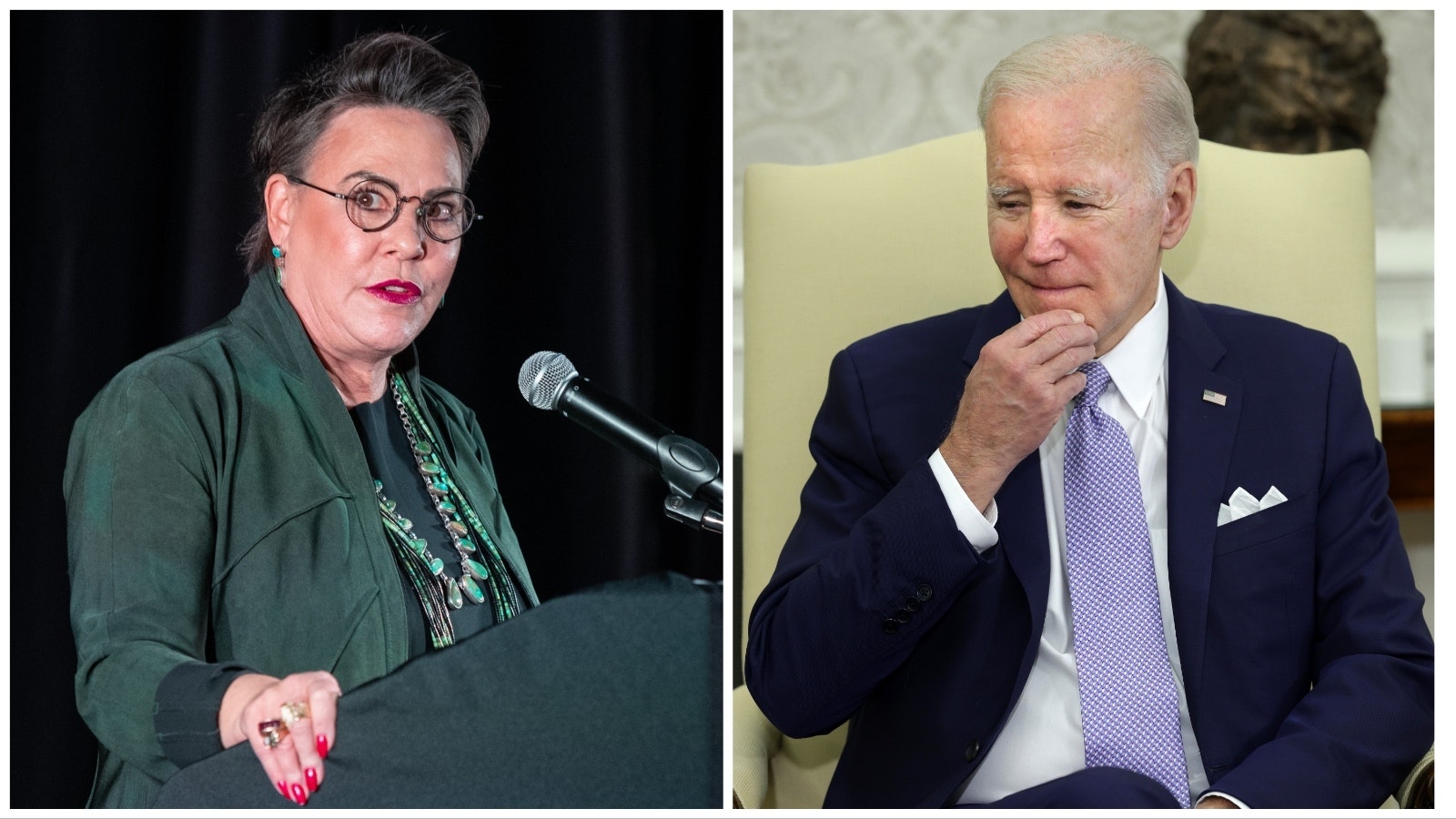Wyoming’s Rep. Harriet Hageman and her Republican peers on a U.S. House subcommittee are urging a panel of federal judges to keep an injunction in place barring the federal government from bullying social media platforms into censoring people.
The lawmakers dropped more than 100 pages of internal emails and notes between Facebook personnel when they filed a Friday amended amicus brief, or advisory document, in the case of Missouri v. Biden.
One of their key proofs of alleged government bullying is the White House’s “outraged” reaction to a humorous meme a Kentucky man posted April 4, 2021.
“When the (President Joe Biden) Administration flagged satirical content about the COVID vaccine, a Facebook executive first warned that removing satirical content would ‘represent a significant incursion into traditional boundaries of free expression in the U.S.,’” reads the brief. “But the Biden Administration was unpersuaded, insisting that the content ‘inhibits confidence in the COVID vaccine.’”
The meme shows Leonardo DiCaprio pointing, as if vindicated, while watching TV, smoking and drinking a beer. The caption reads: “10 years from now you will be watching TV and hear/ ‘Did you or a loved one take the covid vaccine? You may be entitled …’”

Not A Celebrity
The man who posted it, Timothy McComas, is a former senior account manager at Ford Motor Co., according to his Facebook page. He lives in Kentucky and hails from West Virginia.
While many White House requests for post suppression and removal focused on high-profile figures like Robert F. Kennedy Jr. and Tucker Carlson, this instance of “outrage” followed the link’s viral spread.
To date, it has gotten 385,000 shares from McComas’ page alone.
McComas did not immediately respond Monday to a Cowboy State Daily request for comment.
A Meme Though?
Facebook struggled under frequent pressure from White House and other federal officials, the internal emails show. Mainstream media were on board as well.
“We are facing continued pressure from external stakeholders, including the White House and the press, to remove more COVID-19 vaccine discouraging content,” wrote a Facebook executive in an April 27 email to other staffers.
Executives had shared with the White House a list of the top 100 vaccine-related posts on Facebook for the second week of April. The White House “was concerned” over the third-highest post, McComas’ meme. The White House asked Facebook to delete the meme.
Facebook was comfortable at that point with removing “misinformation” about COVID and vaccines, and any posts specifically discouraging vaccination, but couldn’t remove satire under its policies, says the email.
Indeed, Facebook executives would spend the next several weeks justifying and explaining its evolving approach to demoting “vaccine-hesitant” content, which it treated differently than “misinformation.”
“Under our policies, this meme should not be removed,” the email says.
But Facebook leaders were building systems to review and demote more.
‘Hardest To Reach’
Biden’s top advisor was “outraged,” the emails say.
Andy Slavitt, former White House Senior COVID-19 Advisor, argued that the meme was directly comparing Covid vaccines to asbestos poisoning, “in a way which demonstrably inhibits confidence in Covid vaccines amongst those the Biden Administration is trying to reach,” says an April 18 email to other Facebook staffers from platform executive Nick Clegg.
“He was outraged – not too strong a word to describe his reaction – that we did not remove this post which was third most highly ranked post in the data we sent to him,” wrote Clegg, adding that he had countered by noting the unprecedented nature of sudden meme-removal.
Getting Them All Vaccinated
That Facebook was supposedly letting its most vaccine-hesitant users grow ever more hardened against taking the vaccine was a repeating grumble from the White House in 2021.
That April, Facebook reported it was targeting people by race (Latino residents of Maryland, Virginia and New York were more vaccine-hesitant than whites), was monitoring vaccine hesitancy in individual counties, and was roping more-trusted public health agencies into reaching people since there was a big-government mistrust problem.
“Need to be honest here,” said a Facebook staffer in the rough-written minutes from an April 5 call with White House officials, “(there’s a) deficit of trust in the government, deficit of trust in FB.”
It was challenging, the Facebook staffer continued, to figure out the right interventions to reach untrusting people without reinforcing those people’s concerns.
“Who are your trusted sources? Friends and family? Community figure?” the staffer said, brainstorming. The outlet was working with a “number of public health agencies” to do targeted, localized campaigns.
Not YouTube
White House leaders goaded Facebook, saying YouTube was doing a better job at content-moderation.
Clegg wrote internally that that was hard to believe.
The federal officials also told top Facebook executives that they had heard from other Facebook staffers that there was an effort to bombard the White House with useless data on vaccine hesitancy.
Facebook responded by discussing “the wider issue of trust — or the lack of it — between FB and the Biden team related to the events during the election and beyond,” wrote Clegg in an April 18 email to other Facebook executives.
Should We Talk About This?
Three federal judges reviewing Missouri v. Biden wondered last week whether they should consider the internal email cache from Hageman and the other amici, as they consider whether to keep in place the preliminary injunction blocking the federal government from censoring people through social media platforms.
“Are the recent findings and disclosures from recent Congressional proceedings properly before us to consider?” asked Judge Don R. Willett, of Daniel Bentele Hahs Tenny, the Biden Administration’s attorney, during an oral argument Thursday in the Fifth Circuit Court of Appeals.
At that time the judges had an earlier version of the amici brief, and the evidentiary documents with it. But those documents hadn’t been part of the case at the district court level when Judge Terry Doughty crafted the injunction, according to Tenny.
“We can’t take judicial notice of Congress?” countered Judge Jennifer Walker Elrod.
“You can take judicial notice of the fact of the finding,” said Tenny. “You can’t take judicial notice that everything in the finding is true and binding on the court.”
Tenny said he’d be happy to discuss the evidentiary materials. But the discussion quickly shifted onto the definition of coercion.
Clair McFarland can be reached at clair@cowboystatedaily.com.





